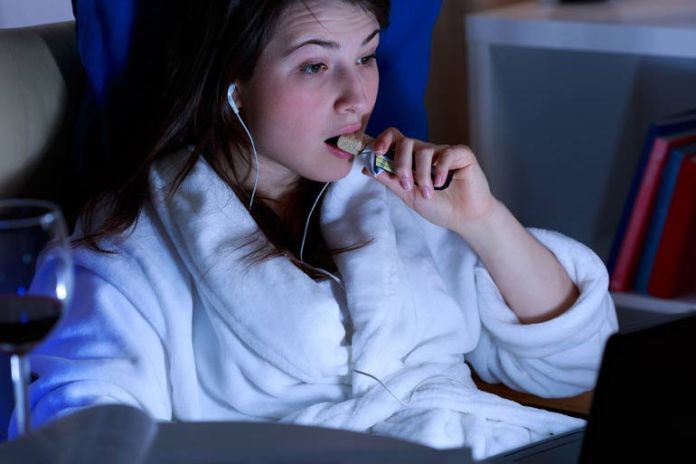If you’re losing out on sleep for some reason or the other every day, it’s time for you to rethink your routine. Lack of sleep can disrupt your hormone levels and make you feel hungry even when your body doesn’t need any food. Whether you’re indulging yourself with sugary treats or junk foods, they can make a significant contribution over time to your weight gain. At the very least, such unhealthy eating practices will surely sabotage your efforts to stay in shape.
How Sleeplessness Is Related To Sugar Cravings

Look around you… you’ll find that obesity and its unhealthy metabolic consequences are continually on the rise. Additionally, there’s an even more alarming trend of people sleeping less and struggling more just to get a good night’s rest.
Two hormones in your body – ghrelin and leptin – play a crucial role in controlling your appetite and satiety.1 While ghrelin stimulates your appetite and prompts you to eat, leptin suppresses your appetite and stimulates you to spend energy. When you sleep well and your brain functions properly, these hormones are released on and off at proper intervals to regulate your feelings of hunger. When you don’t sleep well, your ghrelin levels go up and leptin levels drop down.2
[pullquote]This hormonal imbalance increases your appetite and makes you eat much more than you wanted to, mainly sugars and high-calorie foods![/pullquote]
If you have an occasional sleepless night and end up countering it with a bar of chocolate the next morning, the set back in your weight-loss efforts won’t be too much. Problems may arise and become severe only when you don’t get enough sleep regularly. Your sleeplessness and unhealthy overeating habits can gradually lead to obesity.
The trouble won’t necessarily end if you start watching what you eat. If you cheat sleep, you may have more problems losing weight despite following a healthy diet. Even kids and teens aren’t immune to the effects of sleeplessness. A short sleep time in children can be associated with being overweight.3
Tips To Optimize Your Sleep
1. Get Good Sleep

For starters, get the sleep you need. There’s no other magical way to cut down on your sugar cravings apart from getting enough sleep. If you need to wake up as early as 4:00 AM to go to the gym, change your schedule so you can sleep more. There’s no point in sweating it out at the gym if you’re going to load up on calories throughout the day.
2. Mind When You Workout

On the other hand, don’t work out right before your bedtime. Physical exercise is known to aid sleep. However, your increased adrenaline levels and body temperature after a good workout can keep you from falling asleep.
3. Watch What You Eat

Learn to watch what you eat and eat right. While proteins are a vital factor in keeping you alert, you mostly end up loading up on carbs when you’re tired. A sugar-rich chocolate or health bar will pep you up instantly for about an hour, but you’ll notice a drop in your energy levels thereafter. At such times, a handful of unsalted mixed nuts can be a great substitute. Whole grains with fiber are also a good option as they can fuel you for a longer time.
4. Stop Drinking Alcohol

Avoid alcohol at all costs. You may feel relaxed after having a peg or two of your favorite whiskey, but drinking just before you go to bed can lead to sleep disruption. Alcohol contains nearly the same amount of calories per gram as fat. While you may feel very sleepy after a few rounds of drinks, you’re more likely to wake up often during the night. You’re even likely to end up getting less REM sleep during the first half of the night.
In addition to these tips, make sure that you eat properly at adequate intervals during the day. Despite your best efforts to optimize your sleeping habits, there are no guarantees that sleeping will actually cause weight loss. Medical disorders like chronic sleep deprivation or chronic fragmentation of sleep, obstructive sleep apnea, and other such sleep fragmentation conditions can cause extreme fatigue during the day. You’ll even find the mere thought of doing any physical exercise or activity too daunting.
In such a situation, don’t ignore the signs of sleep deprivation, whether you’re just feeling restless or you have a serious medical condition. Seek help from a qualified medical professional as soon as you can. With proper help, you’ll be able to figure out the reasons why you’re unable to sleep. Once you start making efforts to ensure that your sleep is of the highest quality, you’ll be able to see positive changes in terms of your weight, metabolic rate, and more importantly, your sugar cravings.
References





